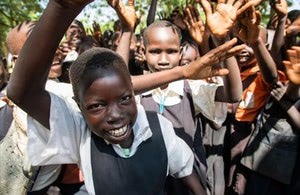PM offers £90M education lifeline to 600,000 children living in conflict

The UK will lead the way in ensuring education for children in the world’s most dangerous and unstable countries.
Children in the world’s most dangerous countries will be given the chance to go to school for the first time thanks to £90m of UK aid funding, the Prime Minister will announce today.
The Prime Minister will also call on G7 countries to dedicate more of their aid budget to education, particularly for girls living in conflict areas. Education currently accounts for less than 2% of global humanitarian aid.
Today’s announcement will support the work of Education Cannot Wait, the global fund for education in emergencies that the UK helped to set up in 2016. The £90m of UK aid will help 600,000 children get an education.
1 in 4 of children not in school live in countries affected by conflicts, humanitarian emergencies and protracted crises and the vast majority of these children are girls.
Girls are more than twice as likely to be out of school if they live in conflict areas, and young women living in conflict are nearly 90% more likely to be out of secondary school than those in other countries. Families are more likely to keep girls than boys at home, particularly when there is a risk of sexual or other violence at or on the way to school. Girls are also less likely to return to education due to being forced to take on caring responsibilities, work or be married early.
A major theme of this year’s G7 is tackling inequality, and the Prime Minister will tell fellow leaders that this cannot be achieved without a wholescale, global commitment to girls’ education. This is a longstanding priority for the Prime Minister – in 2018, while Foreign Secretary, he signed the UK up to the Safe Schools Declaration, committing to protect schools during military operations and armed conflict.
One third of the £90 million funding will be earmarked for those children living through the world’s ‘forgotten crises’, such as the current emergency in the Sahel, where thousands of girls are prevented from going to school due to conflict and instability.
Speaking at the G7 today Prime Minister Boris Johnson said:
Innocent children suffer the most from the brutal reality of life in the world’s most dangerous countries. I’m determined to ensure that all children have a chance to succeed – no matter where they are born. It is only through equipping the adults of tomorrow with learning and skills that we will break this cycle of instability.
And it is girls that suffer the most growing up in societies marred by violence. We owe them better. Girls’ education is the Swiss Army knife that solves a multitude of the world’s problems. Everyone benefits from a world where girls have the same opportunities as their brothers.
I pledged on the steps of Downing Street to ensure that every girl in the world gets 12 years of quality education. I’m proud that today’s announcement will help us do that.
International Development Secretary Alok Sharma said:
Children living through wars and humanitarian crises have had their childhood taken away from them. We will not allow their future to be lost as well.
This is why UK aid is helping some of the most vulnerable children, particularly girls, get the education they deserve. This will have a transformative effect on their lives.
Today, International Development Secretary Alok Sharma will also announce new funding for female entrepreneurs across Africa, giving them training and mentoring to help manage their businesses.
This, along with the additional support for girls’ education announced today, will lift women out of poverty and help bridge the global gender gap which is estimated to cost the world economy $12 trillion.











Responses